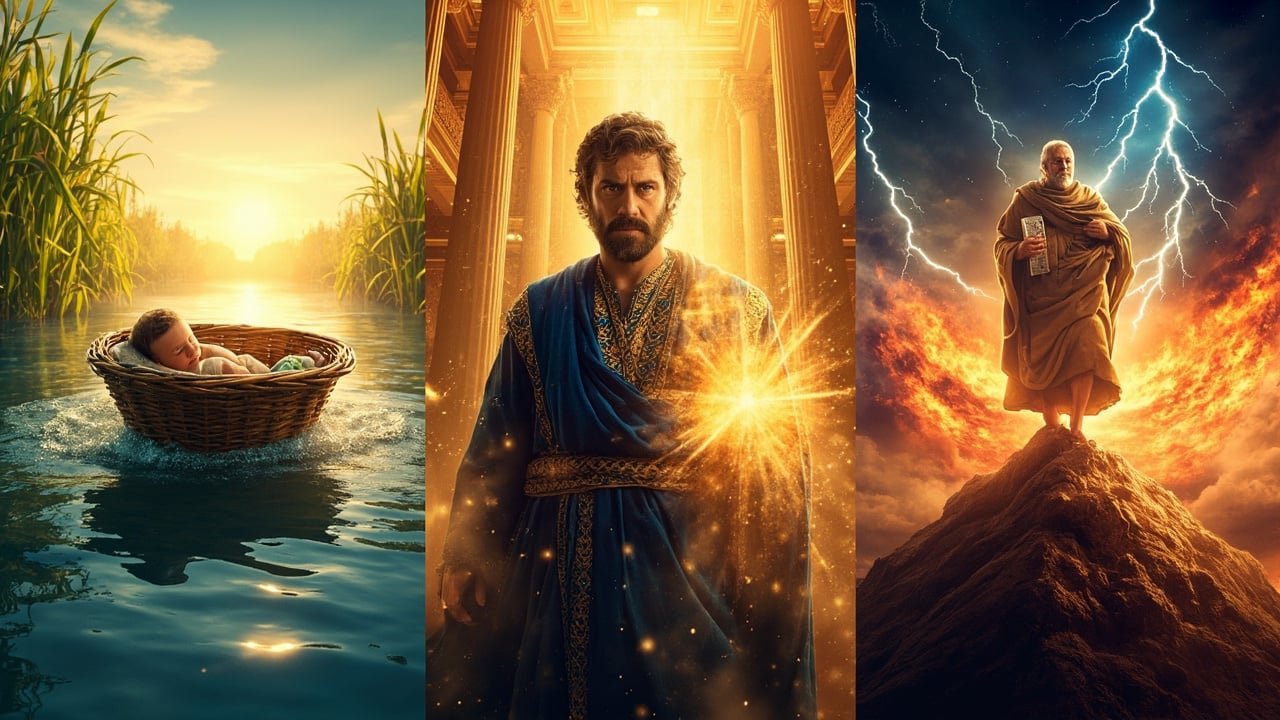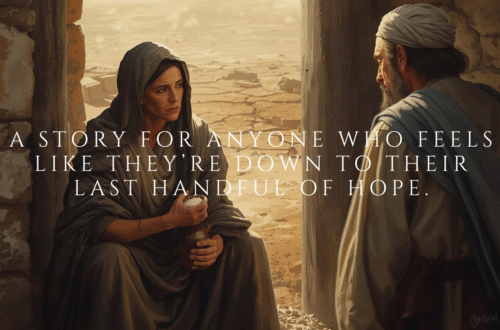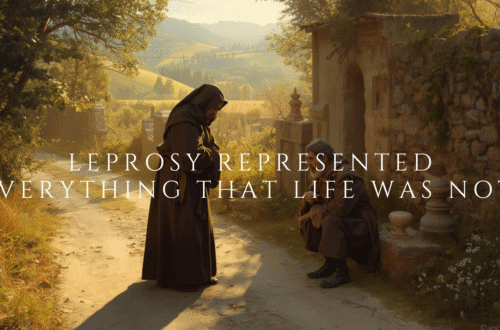Before he ever parted a sea, called down plagues, or climbed Mount Sinai, Moses was a miracle child born into danger and destiny. Raised in Pharaoh’s palace yet carrying Hebrew blood, he lived between two worlds—one of royal privilege and one of suffering. But Moses was not merely a leader or lawgiver; he was a man who spoke with God face to face, whose life became a breathtaking encounter between human weakness and divine glory.
In this article, we’ll trace the extraordinary story of Moses—from his basket in the river to his fiery moment on the mountain. But more than a biography, this is a spiritual journey. We’ll explore what made him worthy of such closeness to God, the lessons he learned in obedience and failure, and what his life still reveals to us today about holiness, calling, and reverence.
“You cannot see My face, for no one may see Me and live… Yet I will cover you with My hand, and you will see My back.”
(Exodus 33:20–23)
Moses didn’t just hear God—he came closer than any mortal soul had ever dared.
He stood in the shadow of the Eternal… and lived to tell it.
From River to Royalty: The Early Life of Moses
Before he was the deliverer, Moses was a child marked by divine prophecy. Born to Hebrew slaves during a time of cruel oppression, his life was instantly under threat. Pharaoh, fearing the rising strength of the Hebrew population, ordered every male child born to the Israelites to be killed at birth (Exodus 1:22). But behind this order was more than racism or paranoia—ancient traditions speak of a prophetic warning that a Hebrew child would rise and overthrow Egypt’s power. Pharaoh, desperate to secure his throne and silence any threat, sought to drown God’s promise in the Nile.
But God’s will cannot be drowned.
Moses’ mother, Jochebed, defied the king’s order by hiding her newborn son for three months. When she could no longer conceal him, she placed him in a papyrus basket and entrusted him to the very waters that were meant to bring death. The Nile, feared as an agent of Pharaoh’s genocide, became instead the river of deliverance. Divine providence carried Moses into the arms of Pharaoh’s own daughter.
Pharaoh’s daughter, moved with compassion, drew the child from the water and raised him as her own. In a stunning twist, Moses grew up in the very palace that had signed his death warrant. He received the finest education in Egypt, learned the language of power, and walked the halls of kings. He was given every tool of privilege—but heaven had different plans.
He was called a “Prince of Egypt” by men, but God was preparing him to be a prophet of fire. The throne awaiting Moses was not one of empire, but of obedience. And his story reminds us: man may plot, kings may decree, but when God ordains a purpose, not even the strongest empire can prevent its unfolding.
Pharaoh tried to kill the future. Instead, he raised him.
A Crime, a Desert, and a Burning Bush
Though he lived in Pharaoh’s palace, Moses never lost sight of his Hebrew blood. The cries of his people echoed louder than the praises of Egypt. One day, when he saw an Egyptian taskmaster beating a Hebrew slave, something in him broke. Fueled by righteous anger, Moses struck the Egyptian down and buried the body in the sand (Exodus 2:11–12).
But justice done in secret does not stay hidden for long.
When Pharaoh learned of the murder, Moses fled into exile—across the desert, into the land of Midian. It was there, at a well, that he stepped in to defend seven sisters being harassed by shepherds. These young women were daughters of Reuel (also called Jethro), the priest of Midian—a man of spiritual insight and moral authority. As a reward for his courage, Moses was welcomed into their home and eventually given Zipporah, one of the daughters, as his wife.
This wasn’t just a romantic union. It was a spiritual intersection. Through Jethro, Moses was exposed to priestly wisdom long before he would receive the Law on Sinai. In this quiet, humble family, far from the courts of Pharaoh, Moses began to learn the rhythms of leadership, humility, and faith.
For forty years, he lived in obscurity as a shepherd. But in God’s hands, obscurity is never wasted. It was here—among sheep, stars, and silence—that Moses saw the impossible: a bush engulfed in flames, yet not consumed. And from that fire came a voice that would shake nations.
God called his name.
This was not a moment of peace—it was a holy disruption. Moses, now a stammering exile, was chosen by the Most High to confront kings, call down plagues, part seas, and lead millions into covenant.
God did not meet him in comfort. He met him in exile. And that moment reminds us: your lowest place may be the very ground where heaven breaks through.
The Man Who Stood Before Pharaoh
Returning to Egypt, Moses came not as a prince, but as a prophet—shaken, reluctant, yet divinely commissioned. Though raised in Pharaoh’s court, he had fled as an exile. Now, he would return with a message from the God of Israel. But Moses was not alone. By God’s instruction, his brother Aaron—whom he had not grown up with and barely knew—was appointed as his voice. Moses would perform the signs; Aaron would speak the words. Together, they would carry a message that wasn’t born of persuasion, but of power: “Let My people go.”
This was more than a diplomatic demand. It was a prophetic confrontation. Pharaoh, who was considered a god by his people, was now being challenged by the true God—the “I AM.” The plagues that followed weren’t just punishments; they were declarations. Each one exposed the impotence of Egypt’s idols: the Nile turned to blood, frogs, gnats, boils, darkness. Every plague disarmed a false god and revealed Yahweh’s supremacy.
Yet even in judgment, God offered mercy. The final plague—the death of the firstborn—was preceded by a warning and a way of escape: the blood of a lamb. The same Pharaoh who once sought to kill Hebrew boys now faced the loss of his own son.
Moses led Israel not just out of slavery, but through a spiritual awakening. The parted sea became the birth canal of a new nation. And the man once afraid to speak stood boldly—because God had kept His promise: “I will be with your mouth.”
When God Nearly Killed Moses
One of the most mysterious and sobering moments in Moses’ life is found in Exodus 4:24–26. After God calls Moses at the burning bush and sends him to liberate Israel, something startling happens on the way: the Lord confronts Moses and seeks to kill him.
Why? Because Moses had failed to circumcise his son—a direct command God had given Abraham as a sign of the everlasting covenant (Genesis 17:10–14). This wasn’t just a cultural oversight. It was a spiritual breach. Moses, the chosen messenger of God, had neglected the very sign of belonging to God’s people.
In a moment of crisis, Zipporah, his Midianite wife, intervened. She quickly circumcised their son and touched Moses’ feet with the blood. Only then did God relent. This gesture, though dramatic and strange to modern readers, was an act of intercession and obedience. Zipporah stood in the gap, and her bold action saved Moses’ life.
This moment reminds us that God’s calling does not cancel the need for obedience. Even someone as chosen, as anointed, and as intimate with God as Moses was still accountable. Holiness is not casual. Proximity to God doesn’t eliminate discipline—it magnifies it.
And there’s a deeper truth here: God was not trying to destroy Moses; He was purifying him. Before Moses could represent the holiness of Yahweh before Pharaoh and all of Egypt, he had to set his own house in order. It’s a principle that still applies: before we stand before others as God’s vessels, we must walk rightly with Him ourselves.
Lessons from the Mountaintop
Mount Sinai was not just a mountain; it was a meeting place between heaven and earth. Moses climbed it, entering thick clouds and fire, and remained there for forty days. He neither ate nor drank, sustained by the presence of God. There, he received the Ten Commandments written by the finger of God Himself.
But when he descended and saw the people worshiping a golden calf, Moses shattered the tablets in holy fury. His anger mirrored God’s. Yet in this moment, we see the cost of leadership—grief, wrath, and intercession. Moses pleaded for the people, even offering his own life in exchange.
Moses lost his temper, yes—but he also bore the burden of a nation’s sin.
The Sin That Cost Him the Promised Land
The desert was dry, the people bitter, and once again, they cried out for water. God, in His mercy, gave Moses clear instructions: “Speak to the rock” (Numbers 20:8). But Moses—frustrated, exhausted, and burdened by decades of complaints—lost control. Instead of speaking, he struck the rock. Twice. Water poured out… but so did God’s disappointment.
This may seem small to us, but in God’s eyes, it was sacred. Why?
Because Moses misrepresented Him. The rock was a symbol of God’s gentleness, provision, and authority. By striking it in anger, Moses turned a moment of mercy into one of rage. And in doing so, he showed the people a distorted image of God’s heart. He allowed his temper to speak louder than his obedience.
That moment cost him dearly: Moses would see the Promised Land, but never enter it.
To walk with God means more than quoting Scripture or performing miracles. It means reflecting His character even when our patience runs thin. God is slow to anger—and those who represent Him must be too. Anger may feel justified in the moment, but when it overrides obedience, it leads to regret. Even great prophets are not exempt.
This is more than a story of leadership failure—it’s a mirror for anyone who has ever led others, guided a family, or served in ministry. Holiness is not just about what we do… but how we do it.
Death on the Mountain, Buried by God
At the end of his life, Moses climbed Mount Nebo. From its peak, he saw the land flowing with milk and honey. But he would not enter. God Himself buried Moses, and no one knows where (Deuteronomy 34:1–5).
His eyes were undimmed, his strength intact. Scripture tells us, “The LORD would speak to Moses face to face, as one speaks to a friend” (Exodus 33:11). This doesn’t mean Moses saw the fullness of God’s glory—because in the same chapter, God says, “You cannot see My face, for no one may see Me and live” (Exodus 33:20). Rather, it means that Moses experienced a unique, intimate relationship with God—one marked by clarity, depth, and directness.
Moses had led millions through deserts and wars, carried tablets of fire, and received visions that would shape all of history. He died alone—but not abandoned.
God buried His friend.
Why Moses Still Matters Today
Moses is not just a figure of the past. His life still speaks:
- To the weary leader who feels unqualified: God equips the humble.
- To the passionate believer who wants to see God’s glory: intimacy is possible, but it comes with reverence.
- To the disobedient who think their role exempts them: holiness is not optional.
- To those in exile who wonder if they are forgotten: your wilderness may be preparation.
Jesus later spoke of Moses. On the Mount of Transfiguration, it was Moses and Elijah who appeared beside Him. And in the book of Revelation, the redeemed sing the song of Moses and the Lamb (Revelation 15:3).
He who once stood alone with God… still stands.
Final Reflection:
Moses’ story is not about perfection. It is about proximity to God. A bush, a cloud, a rock, a mountain—in each, we see that the Eternal meets the earthly in ways that shape history.
May we too burn with holy purpose, speak boldly when called, and bow in reverent obedience.
Let the story of Moses awaken your courage, renew your devotion, and prepare you for the mountaintop.
“The LORD would speak to Moses face to face, as one speaks to a friend.”
(Exodus 33:11)




